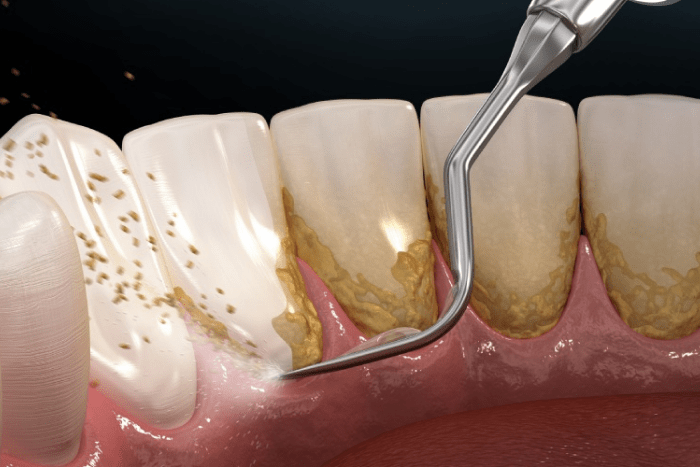Dental Plaque – What It Is and How to Prevent It

When it is not treated, dental plaque can trigger so many problems in the mouth and body. To avoid buildup of tartar and enamel breakdown, the dental plaque should be removed early. With oral hygiene, professional dental cleaning and oral checkups, it’s easy to manage plaque formation.
What is dental plaque?
When combined with saliva in the mouth, the food and drinks we consume forms bacteria deposited as a yellowish sticky film. This is found between teeth and the gum line. Usually, this deposit is what you see in the morning before brushing. Another name for dental plaque is microbial plaque, tooth plaque and dental biofilm.
As plaque keeps forming, it becomes a problem for oral health. This is because bacteria continues to grow and becomes more acidic to the point that it erodes the tooth enamel. In the body, the hardest mineral substance is the tooth enamel. Its strength even surpasses that of the bone. Damaged or eroded enamel is beyond repair or replacement. When the enamel breaks down, it leads to pain, tooth sensitivity and other oral concerns.
Dental plaque is a condition that a scale and polish can treat with a stringent oral care regime – regular dental checkups, brushing two times every day, flossing at least once a day, and the use of non-alcoholic mouthwash. A prolonged dental plaque with treatment becomes complex, causing permanent damage and severe harm to the body’s general well-being.
Keep in mind that what you eat every day contributes to plaque building, which is why it’s imperative to keep following a dentist-recommended oral care routine.
Causes of dental plaque and formation of tartar
After dental plaque; the next important thing is tartar. When you’re unable to keep on the low and remove the bacteria that cause plaque buildup in the mouth, the result is tartar. As plaque increases, it constitutes tartar directly as the saliva mixes with food particles and drinks you take every day.
As a result, these remnants of food and drinks add up to the tooth plaque. In a day or three days, the biofilm gets harder and could likely change into a black colour and strongly bond to the tooth surface. And that’s tartar.
Unlike plaque, tartar binds strongly to the teeth, and as such, only a dentist can remove it.
Certain lifestyles like smoking, eating sugar-rich foods and irregular teeth brushing and flossing can increase the risk of having plaque and tartar. Dental appliances like braces, conditions like dry mouth, ageing and crowded teeth are other risk factors.
It is typical for people who are into carb-rich foods, including baked goods, fruit, candy, and soft drinks, to develop plaque.
Despite this, one cannot completely avoid the formation of plaque and tartar as it would mean not eating certain healthy foods like veggies and fruits. So, you need to keep your mouth and teeth clean all the time to avoid plaque, tartar and more severe gum disease.
Signs and symptoms of dental plaque
That there’s plaque or tartar on your teeth doesn’t mean you’re sick; rather, they can trigger severe oral problems like periodontitis plus other dental and physical health issues. But certain tell-tale signs may be linked to serious plaque and tartar formation. These are:
- Holes formed in the teeth due to long-standing damage triggered by regular intake of sugared foods and drinks, zero oral care and bacteria. Cavities are also called caries or tooth decay.
- That the mouth smells bad all the time will not just cause embarrassment but also a symptom of decay. The interaction of food and drinks with saliva causes plaque, so there can be an unpleasant smell from it when untreated. It’s normal for the mouth to smell in the morning, but if this continues regardless of all you do for the whole day, it’s time to see a dentist.
- This is a benign form of early gum disease that shows up on the gumline. Gingivitis can be the reason for swelling, soreness, bleeding gums while brushing and inflamed gums.
Preventing dental plaque formation
Since dental plaque is inevitable, it’s better to choose what you eat and drink carefully. You need to avoid taking processed sugars; even excessive coffee and tea can possibly harm your teeth. Drink more water daily and take your coffee and tea with a straw to keep the teeth unstained.
Rinse out your mouth with water after eating meals and snacks to remove food remnants and stop bacteria from growing.
It’s critical to keep up good oral hygiene consistently.
Treatment option for dental plaque
Dentalhygienist.london offers a scale and polish in London for patients with plaque. We also offer dental cleaning at least two times in a year and add it to your oral care regime at home. So, feel free to schedule an appointment with us today for help with plaque and tartar buildup and have the best possible dental health.




